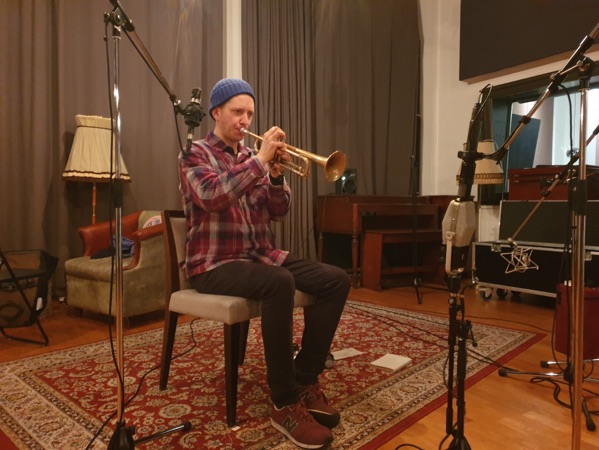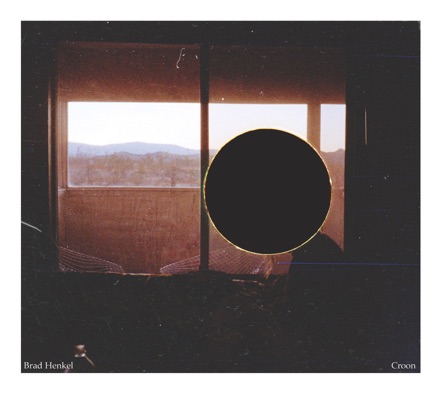Neither/Nor Records


Brad Henkel interviewed by Sean Ali in February 2022 for the release of Croon (n/n 021)
Sean Ali: Before getting into some of the more granular elements of the album, I’d like to start broad. You’ve been performing and recording improvised music for many years now. It surprised me to learn that this was your first solo album. What was it about this time in your life that made you feel that now was the time to create and release this work and what was the impetus behind the approach?
Brad Henkel: I have played the occasional solo concert over the years. I enjoy the format– the brick wall of silence that awaits you when you stop playing, when your idea runs out of steam. I’ve always learned a lot about myself in those playing situations, so it's something I try to do from time to time. But the impetus to make a full studio recording arose out of the corona lockdown. I was playing a lot by myself. I started to share one minute video clips of specific sound ideas on social media, just as a way to say hello to the people I would have encountered were it not for lockdown. I thought perhaps there was something there worth expanding on. Not long after, I applied for a small stipend from the city of Berlin which set the whole thing in motion in terms of getting a studio date and making it a reality.
Each piece is based on a specific preparation of the trumpet, or approach to playing the trumpet. Rather than blend one technique into another and string it along that way, which is how I often formed my solo concerts, I decided I would exhaust one idea and stop.

BH: My approach differs somewhat between mediums. Having concise ideas and track cuts works well for me in recorded format, but is perhaps not so performative and as such would not always work as well in live settings where I tend to search out transitions and overlaps of material. Lately, I’m leaning on the idea that having concise tracks works well in recorded music. It tends to invite multiple listenings. A live performance is something different. It’s a kind of ritual that the audience and performer(s) experience together. I don’t think you can replicate that so easily in the studio. For this recording, we changed the mic setup for almost every track. We took our time and sound checked for each piece. We changed mic positions, mic levels, even microphones, I think. Playing with a live performance mentality would have caused the sound quality of each individual piece to suffer.
SA: And how did you narrow it down to these specific eight ideas? You have such a variety of trumpet techniques that I imagine you could easily have recorded many tracks with this approach. There’s an emotional and intimate quality to these tracks that is belied by their track titles, which are just descriptions of the sound or technique. How did you land on these eight specific ones amongst the many others that were at your disposal?
BH: Part of my decision was based on sounds I had been working on throughout the year leading up to the recording date and part of it was based on finding a balance– trying to make a listenable flow of tracks. I wanted to avoid making a solo record that was a checklist of my various trumpet techniques. But I do see the record as more holistic than conceptual. Another approach would have been to take one track/idea (the air /broken radiator track for instance) and build a whole record focusing on that world.
SA: Yes, I do believe that holistic quality comes across quite clearly listening to it. You mention that the tracks found on the album were based on sounds that you had been working on for the past year. How did you know when the sounds were ready to be recorded? Aside from merely practicing, is there anything extra musical (like meditation, for example) you do to prepare for a recording like this?
BH: I recorded myself a lot in the months leading up to the recording date. Sometimes, something feels great to play, but listening back a few days later you find it’s not so interesting. Or vice versa. You discover that something you thought didn’t have much going on sparks your interest. I also listened to a lot of solo records which inspired me to work on my own solo music.
The most work in preparing for a solo trumpet record date is getting in the physical shape to do it. Trumpet is extremely physical. I was just trying to stay strong so I could play for an extended period of time. I recorded the whole record, two takes of each track (plus a couple tracks that didn’t make the cut), in one day. A lot of the ways I play involve keeping the horn on the lips for extended periods so I played tons of “long tones” exercises while preparing for the session.
SA: I had the pleasure of having dinner with your family last time I was in Berlin. Has being a father changed anything about how you approach playing and selecting what and how to record? I ask because I find solo albums show musicians at their most personal state, so I’m always curious about how events in the personal life affect the musical life.
BH: Hmm. I haven’t thought much about that. Perhaps it has helped me to trust my musical intuition more. I’m not afraid to sound cheesy. As in, if I want to play something pretty, I go for it. I feel more comfortable with taking risks in music. Being a father has definitely made my creative practice more organized. From a purely time management standpoint, it has made my practice more efficient. I take the trumpet more seriously than before as well– the technical aspects of playing. But it’s hard for me to distinguish whether these changes come from becoming a father, getting older, or external things like pandemics and dictators.
(Charlie says hi. And would like to know if he could play your bass next time.)

SA: Since you mentioned “pandemics and dictators,” do you feel that this record in particular or your music in general has a political aspect? Or, more broadly, what role do you feel that improvised music has in the political realm? I’m always curious how improvising musicians navigate this relationship since our medium is neither linguistic nor representational. (Charlie is welcome to play my bass anytime!)
BH: The record isn’t overtly politically motivated, no. Wow, big questions. I’m not the most equipped person to answer them. I guess I regard any social activity as having a political aspect. And improvised music is very entangled with social activity. There are some nice ideas about the leveling of power dynamics in improvised music as opposed to say, orchestral music. I think those are some of the reasons I tend towards improvised music. However, I think there is danger in believing improvised music in itself has some sort of revolutionary, political aspect to it. Playing improvised music in itself won’t solve political problems. It can’t replace activism, but it can make life more interesting. Seeing live, improvised music in a small club is still one of my absolute favorite things to do. And it feels more valuable now than it did even 10 years ago. Where else do you get a group of people to come together to give their undivided attention and intently listen for 40 minutes straight?
SA: Thanks so much for taking the time to answer my questions. I’m excited for people to hear it and I hope they enjoy it as much as I did. Before we conclude the interview, I was wondering if you could share some of your plans for the future. Do you have any other upcoming projects or releases you’re excited about it? Can we expect a Trumpet Solos II sometime down the road?
BH: Thank you, Sean! I just released a new trio record with Dustin Carlson on guitar and Samuel Hall on drums. That trio is also working on new music and recording again in May. I also have plans to record another Merry Peers (my duo with Yoshiko Klein on synthesizer) album this year. Plus I am starting a new quartet with piano, bass and drums. So far I don’t have plans for a second solo record, but I have two solo shows coming up. One in Brooklyn on April 6th at Record Shop and the other in Hamburg, Germany on May 18th.
Anyone who is interested can check for new material on my website www.bradhenkel.com, and you can find information about live performances on social media.
Photo credits and information:
The album cover is by Nathaniel Morgan.
The photos from from the recording session at Blackbird Music Studio in Berlin were taken by Sebastian Ohmert.
